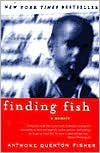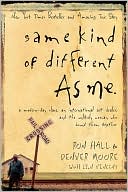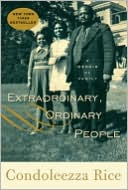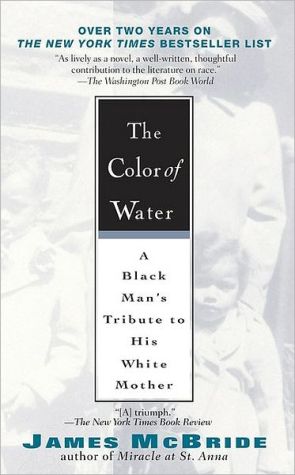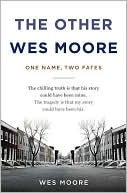Finding Fish
Born in prison to a single mother, Antwone Fisher was a ward of Cleveland's foster care system until he was taken in by a family who subjected him to verbal and sexual abuse throughout his adolescence. At 17, Fish escaped, only to suffer the hardships of life on the streets. Enlisting in the U.S. Navy, he found a "family" of his own. But before he could make peace with his past, he had to discover who he really was and where he came from—an inspiring, fascinating journey that lead from the...
Search in google:
Born in prison to a single mother, Antwone Fisher was a ward of Cleveland's foster care system until he was taken in by a family who subjected him to verbal and sexual abuse throughout his adolescence. At 17, Fish escaped, only to suffer the hardships of life on the streets. Enlisting in the U.S. Navy, he found a "family" of his own. But before he could make peace with his past, he had to discover who he really was and where he came from—an inspiring, fascinating journey that lead from the mean streets of Cleveland to the highest echelons in Hollywood.About the Authors:Antowne Q. Fisher is a producer and screenwriter working in Hollywood. He lives in Los Angeles, CA.Mim E. Rivas has worked on more than 10 books, including Betty DeGeneres's Love, Ellen: A Mother/Daughter JourneyBookPageFinding Fish, compellingly read by Alton Fitzgerald White, is [Antwone Fisher's]story, told with candor and without self-pity.
Chapter One\ If I follow the path of memory back to its start, I begin life looking out my upstairs bedroom window. It's here I have my best daydreams and where I can make up stories I like to think about. In my mind's first flash of light, I am here, on the inside looking out of the Picketts' two-story house on a street at the edge of Glenville, the second house from the corner, a block from 105. This is a snowcovered morning when the other kids, already school age, are gone and I'm alone, staring out into the blinding whiteness, thinking it's no fun being left behind, no one to play with.\ There is something about being at this window that makes me feel safe. Depends on the smell, though. Young as I am, I have already learned to tell what kind of day it's going to be by the scent of the air in the morning. I can smell rain coming. Not just rain and weather and snow, like now, but other clues. Pancakes on the stove, I know it's going to be a good day. The smell of eggs and grits or water steaming off the driveway after Mizz Pickett hoses it down, either one means I better be on the lookout all day.\ I squint my eyes real hard and try to use my special heat-ray vision to melt all the snow. Nothing happens. My powers must need more practice, I decide. Maybe I should try the looking-through-walls trick. That way, I can catch everybody in their alien monster faces.\ Yep, everybody in this house, except me -- aliens. Mizz Pickett, the alien leader, Reverend Pickett (her trusty sidekick), and their older kids, whose last names are Pickett. Even Dwight and Flo, who have different last names, like me. Children aliens. They just have to pretend to bescared, so I think they're human like me.\ The thing about aliens is that when I'm not in the room they don't have on their human faces. And they have kind of goat bodies with hooves and horns and Devil bugging-out eyeballs and long black sideburns. But just before I come into a room, they slip into disguise so I can't catch 'em. One day, I tell myself, I'm gonna be reeeeaaIll quiet and tiptoe down the stairs from the bedroom and sneak soooo carefully into the kitchen and catch Mizz Pickett standing over the stove in her alien body and face -- before she uses her powers to see me first. Cooking raccoons always weakens her powers.\ But instead of trying to catch her this day, I keep standing at the window, practicing my snow-melting skills. Right now, I know, if I really go out there, the snow will freeze me, so I better just stay in here and daydream some more.\ It seems the time came for the visits to child welfare whenever I was doing something I didn't want to be interrupted from, like daydreaming. That's the first thing. Next, I got to be on the watch that she's gonna try to be nice to me. But it don't never last, and that's why I rather she stay her regular way -- mean.\ I'm at my spot, looking out the window, and I feel her there, standing behind me, all in her monster face and stuff, just waiting for me to turn around so she can practice putting on her human face. That's how monsters play. But I don't fall for that 'cause I know she's not nice. Besides, she's too old to play with kids. So I keep staring out the window, pretending I don't know she's there at the door.\ Dwight is in the closet. He's mad at everybody 'cause he's gotta go with me on the visit to the social services office. That's where all the white people are. Except the one they call my caseworker, who's colored like me. There's another one I saw there, too. She was late I heard them say. Another time they said she was coming but she didn't. But I don't care. I only like to see the toys they got in the toy box and play with them for a little while.\ Usually I have to go there by myself but today Dwight's coming, too, and I'm glad. It means I'm not the only one wearing the church clothes. It makes me feel special when I'm the only one wearing them on a weekday. I hate feeling special.\ I can feel her behind me, opening her mouth, showing her big sharp teeth, and now I'm scared, but this time, I turn around real fast and she's changed human again. Standing there in the doorway, smiling that fake smile.\ "Where is Dwight?" she says.\ The closet door creaks slowly open and out steps Dwight, his red-green-and-yellow-plaid Sunday-school bow tie slightly crooked.\ "What-choo doin' in dat dhere closet? Nigga! Get on out here so we can get ready ta go! Ya think we got all day?"\ "No ma'am."\ She grabs him by the shoulder and jerks at the bow tie to straighten it.\ Then she turns back to me with that same put-on smile as I hop to the floor in panic. Panic that she will yell at me next. But instead of yelling, she talks in a making-fun, teasing way, telling Dwight, "Twonny has ta see his momma today." Barely concealing her disapproval of the visit, her mouth twists as she talks and she pushes up her glasses from slipping down her nose, like she's mad at the glasses that she has to take me downtown in the rain.\ Her words stick in my ears and my mind...\ Finding Fish. Copyright © by Antwone Fisher. Reprinted by permission of HarperCollins Publishers, Inc. All rights reserved. Available now wherever books are sold.
Pre-memoir: An Uninvited Guest1Act 1Ward of the State3111959 to 19643321965 to 19696131969 to 197210141973 to 1976149Act 2The Rain That Falls21151976 to 197721361977243Act 3Man of the World26371977 to 199226581992301Post-memoir: Finding Fish327Acknowledgments341
\ From Barnes & NobleFinding Fish is the extraordinary memoir of a young man who grew up in a daunting environment. Born to a single mother in prison, Fisher matured despite the savage discipline of a foster home and the sexual assault of a female neighbor.\ \ \ \ \ BookPageFinding Fish, compellingly read by Alton Fitzgerald White, is [Antwone Fisher's]story, told with candor and without self-pity.\ \ \ Denzel WashingtonFinding Fish reads like a great work of fiction, moving me alternately to tears and laughter, sorrow and joy, and making me forget at times that the story is in fact astonishingly true. Antwone Fisher's journey is truly a triumph of the spirit, the story of a boy born into circumstances that few of us could withstand, yet who not only survives, but goes on to remarkable success beyond most of our dreams. In a voice that is authentic and raw, Antwone tells of the power of finding one's voice as an artist and a human being. I hope this book is embraced by readers of every color and age.\ \ \ \ \ Publishers Weekly\ - Publisher's Weekly\ An unflinching look at the adverse effects foster care can have on a child's life, this stunning autobiography rises above the pack of success fables from survivors of America's inner cities. Born in the 1950s to an underage single mother serving time in prison for murder, Fisher was placed in the home of a staunch minister and his wife, who appeared to be a loving couple to the series of foster care workers who monitored their home in one of Cleveland's working-class neighborhoods. Writing in a deft mix of elegant prose and forceful dialect, Fisher is especially adept at dramatizing the tactics of control and intimidation practiced by his foster mother on the abused children in her care, such as crushing Fisher's self-esteem by calling him worthless, shaming one girl after she began her period and making the boys bathe with Clorox. (Fisher supports his detailed recollections with excerpts from the actual foster-care records.) An added bonus is the author's vibrant recreation of several key black neighborhoods in Cleveland during the golden age of the Black Power movement, before the areas disappeared under the aegis of urban "renewal." If a major feature of survival memoirs is their ability to impress readers with the subject's long, steady climb to redemption and excellence, then this engrossing book is a classic. Copyright 2000 Cahners Business Information.\ \ \ \ \ VOYAOnce people called him Baby Boy Fisher. Later he was Twonny, Nigga, or Fish. Now, he is Antwone Quenton Fisher, successful screenwriter and producer. He was born in a prison hospital facility to a seventeen-year-old single mother. Caseworkers moved him from an orphanage into a succession of two foster homes in which he endured thirteen years of physical, emotional, and sexual abuse. A reform school offered the shy and withdrawn child a measure of stability before he was plunged into the horrors of homelessness and life on the fringes of crime. A fortunate chance to enlist in the military set his life on a positive path. The United States Navy became the family he never had, nurturing and developing his extraordinary talents for poetry and storytelling. Screenwriter of Double-O-Soul and Jelly Beans, ultimately this throwaway child became one of the most sought-after screenwriters in Hollywood. Detailing life from abandonment through despair to triumph, this book is a powerful and poetic autobiography as gripping as any novel. Fisher manages to avoid self-pity and anger as he describes in matter-of-fact and moving narrative how a flawed and over-stretched social welfare system almost destroyed a child. Give this rich and extraordinary book to older teens who will laugh and cry with Fish as they share his journey to self-knowledge. VOYA CODES: 5Q 4P S A/YA (Hard to imagine it being any better written; Broad general YA appeal; Senior High, defined as grades 10 to 12; Adult and Young Adult). 2001, HarperCollins, 340p, $25. Ages 15 to Adult. Reviewer: Jamie S. Hansen\ \ \ \ \ Library JournalFisher's early life could have destroyed him: born to an unwed mother in a juvenile facility and a father who was killed by another girlfriend, he was sent to an abusive foster mother who eventually threw him out. Fisher found himself on the street, but he was lucky. He had a teacher who encouraged him to reach for his goals, social workers who tried to help, and other mentors who saw the good in him and forced him to try harder. Fisher is a phenomenal writer who tells his story in a straightforward fashion, using beautiful language. Listeners will get caught up in tales of his foster siblings and neighborhood friends; they will root for him to overcome his encounters with drug dealers; and they will cheer his success and the love he has found with his birth family and his wife and daughter. Alton Fitzgerald White does a fine job helping to bring the young Fisher to life. The author himself takes over the reading at the end, relating what led to his starting a new career as a screenwriter. An excellent production; for all libraries. Danna Bell-Russel, Library of Congress Copyright 2001 Cahners Business Information.\ \ \ \ \ Kirkus ReviewsProducer and screenwriter Fisher debuts as a memoirist of first rank with his moving and unsparing story about growing up an African-American ward of the state in Cleveland in the 1960s and '70s. A foster child from day one—Fisher was born in prison to a single mother, and his father was shot and killed by another girlfriend—the author came to live with the Pickett family, an older couple with grown children who boarded other foster children primarily for financial gain. Subjected to routine physical and emotional abuse by Mrs. Pickett (and sexual abuse by a neighbor),"Fish," as he was called, coped by keeping his thoughts and feelings hidden and living for the brief, unexpected moments of kindness and understanding from teachers and social workers. Deeply shy and lacking self-esteem, he escaped the foster-care system just before his 18th birthday, only to face the harsh reality of homelessness. It was not until he enlisted in the Navy that Fish learned to trust himself and others, to experience friendship and love; he even gained the courage to revisit his childhood home and find the extended family he had never known. While in the service Fish also discovered that he had a gift with words—and it is precisely this talent that breathes pleasure into what could be an unremittingly depressing tale. His observations about the changing neighborhoods of Cleveland or the just-out-of-reach efforts of those who tried to help are rendered keenly and poignantly, and his superb narrative choices and control bring the grim realities (as well as interior emotional pivots) of his life into sharp relief. A striking and original story of the journey from troubled childhoodtoself-awareadult, Fisher's account strikes the universal chords so often missing from contemporary memoir. Film rights to Denzel Washington/20th Century Fox; author tour\ \
